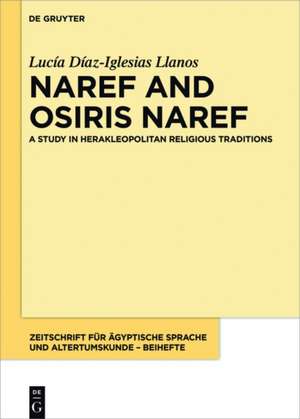Naref and Osiris Naref: A Study in Herakleopolitan Religious Traditions: Zeitschrift für ägyptische Sprache und Altertumskunde – Beiheft, cartea 3
Autor Lucía Díaz-Iglesias Llanosen Limba Engleză Electronic book text – 31 dec 2016
The book aims to approach the funerary, legal, and royal mythological associations developed around Naref (an important landmark of the Herakleopolitan territory), attested for the first time in the so-called Coffin Texts and enduring until the Roman Period. It also seeks to analyse the characteristics of Osiris Naref, a prominent deity in the Herakleopolitan pantheon from the New Kingdom onwards who achieved suprarregional importance. His key features — centred on the mythical episodes of rebirth and defeat of enemies, justification, and assumption of royal power — gave rise to an Osirian form "who cannot/will not be evicted" from the legitimate and secluded place he has reached. Both aspects are analysed within the wider context of regional (religious, historical, landscape) characteristics.
This monograph offers valuable insights into the study of both local mythical and cultic toponyms and of regional manifestations of Osiris.
Preț: 761.94 lei
Preț vechi: 1043.76 lei
-27% Nou
Puncte Express: 1143
Preț estimativ în valută:
145.79€ • 152.22$ • 120.67£
145.79€ • 152.22$ • 120.67£
Indisponibil temporar
Doresc să fiu notificat când acest titlu va fi disponibil:
Se trimite...
Preluare comenzi: 021 569.72.76
Specificații
ISBN-13: 9783110498240
ISBN-10: 3110498243
Pagini: 395
Editura: De Gruyter
Colecția De Gruyter
Seria Zeitschrift für ägyptische Sprache und Altertumskunde – Beiheft
Locul publicării:Berlin/Boston
ISBN-10: 3110498243
Pagini: 395
Editura: De Gruyter
Colecția De Gruyter
Seria Zeitschrift für ägyptische Sprache und Altertumskunde – Beiheft
Locul publicării:Berlin/Boston
Descriere
The ancient Egyptian toponym Naref and the god Osiris Naref have hitherto been the subject of brief discussions. This study gathers for the first time all data available on these issues, revises traditionally accepted ideas, and offers integral interpretations — contextualizing them in the local milieu.
The book aims to approach the funerary, legal, and royal mythological associations developed around Naref (an important landmark of the Herakleopolitan territory), attested for the first time in the so-called Coffin Texts and enduring until the Roman Period. It also seeks to analyse the characteristics of Osiris Naref, a prominent deity in the Herakleopolitan pantheon from the New Kingdom onwards who achieved suprarregional importance. His key features — centred on the mythical episodes of rebirth and defeat of enemies, justification, and assumption of royal power — gave rise to an Osirian form "who cannot/will not be evicted" from the legitimate and secluded place he has reached. Both aspects are analysed within the wider context of regional (religious, historical, landscape) characteristics.
This monograph offers valuable insights into the study of both local mythical and cultic toponyms and of regional manifestations of Osiris.
The book aims to approach the funerary, legal, and royal mythological associations developed around Naref (an important landmark of the Herakleopolitan territory), attested for the first time in the so-called Coffin Texts and enduring until the Roman Period. It also seeks to analyse the characteristics of Osiris Naref, a prominent deity in the Herakleopolitan pantheon from the New Kingdom onwards who achieved suprarregional importance. His key features — centred on the mythical episodes of rebirth and defeat of enemies, justification, and assumption of royal power — gave rise to an Osirian form "who cannot/will not be evicted" from the legitimate and secluded place he has reached. Both aspects are analysed within the wider context of regional (religious, historical, landscape) characteristics.
This monograph offers valuable insights into the study of both local mythical and cultic toponyms and of regional manifestations of Osiris.



